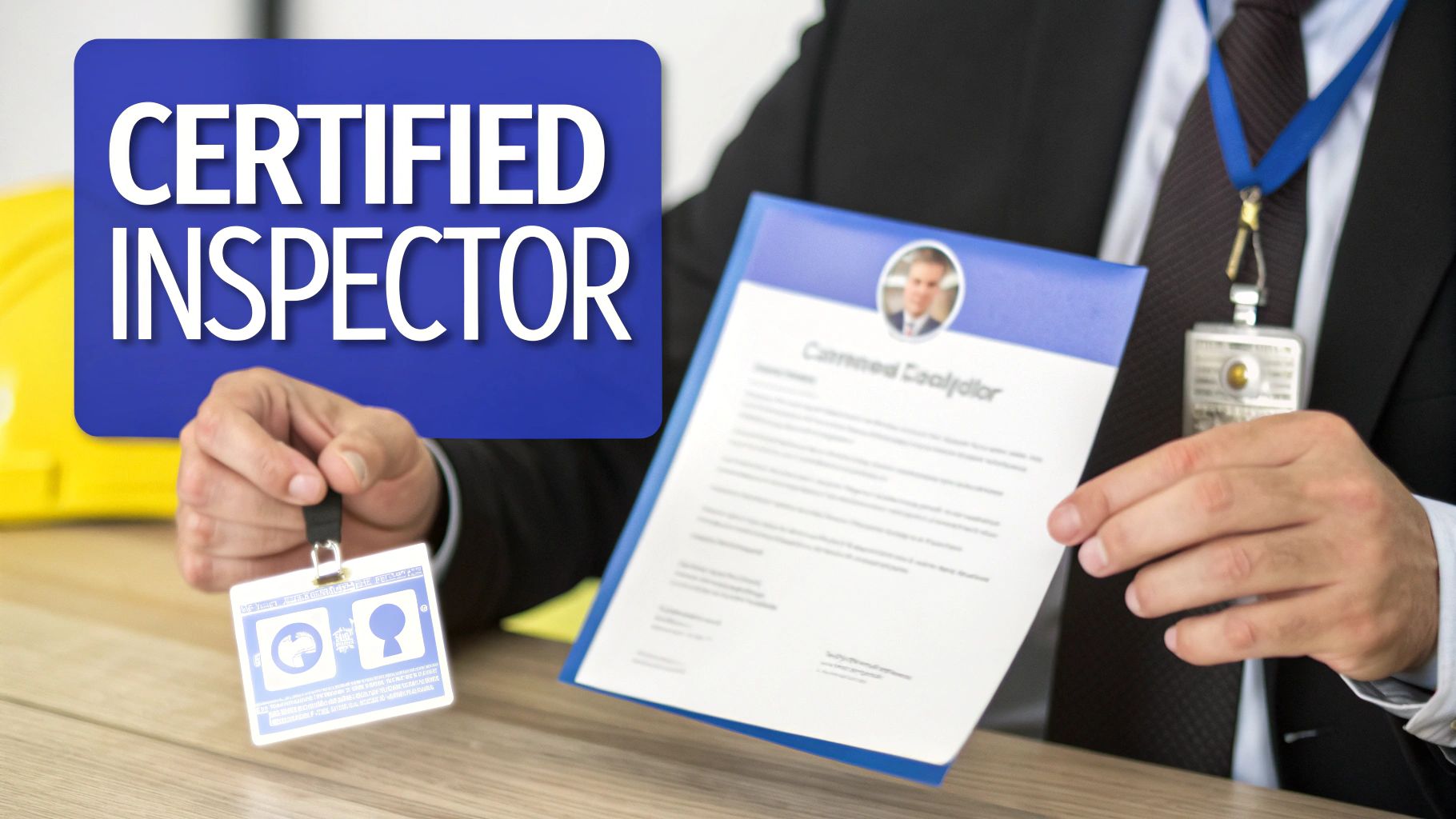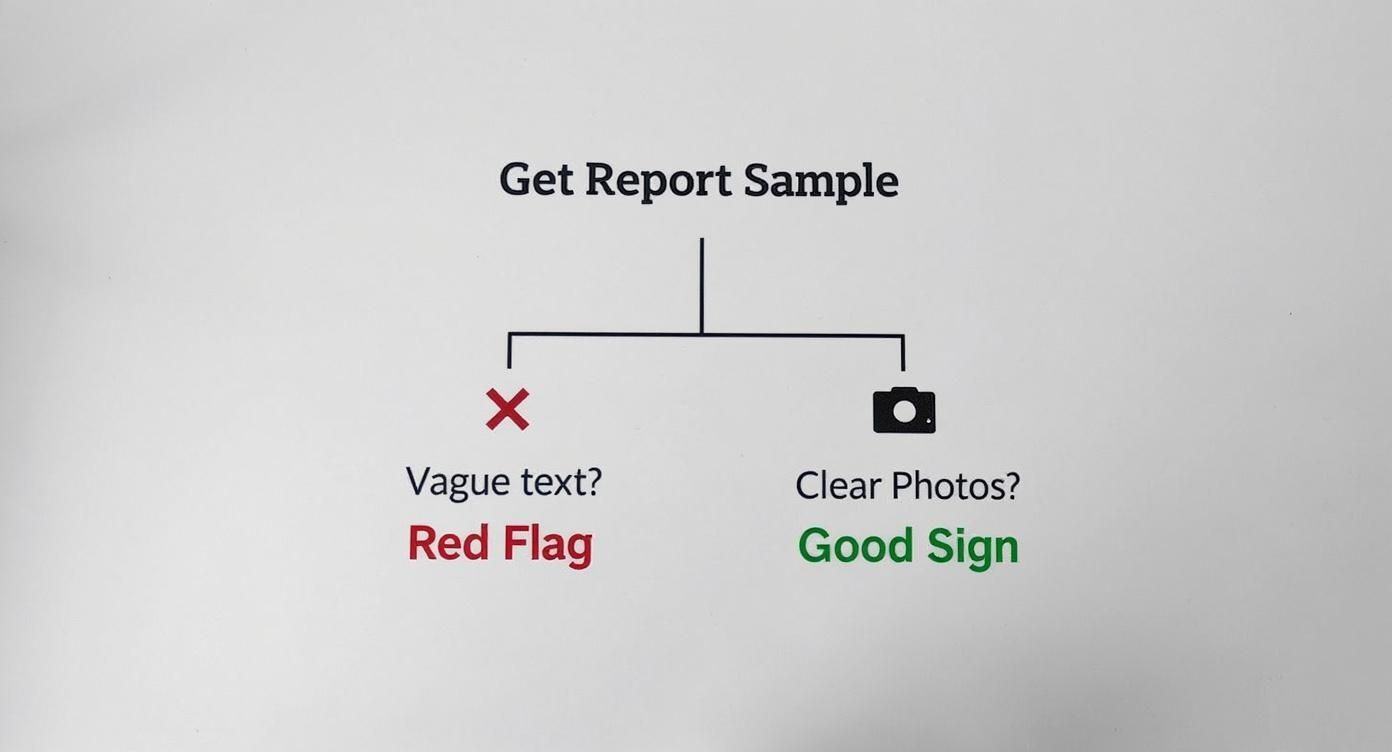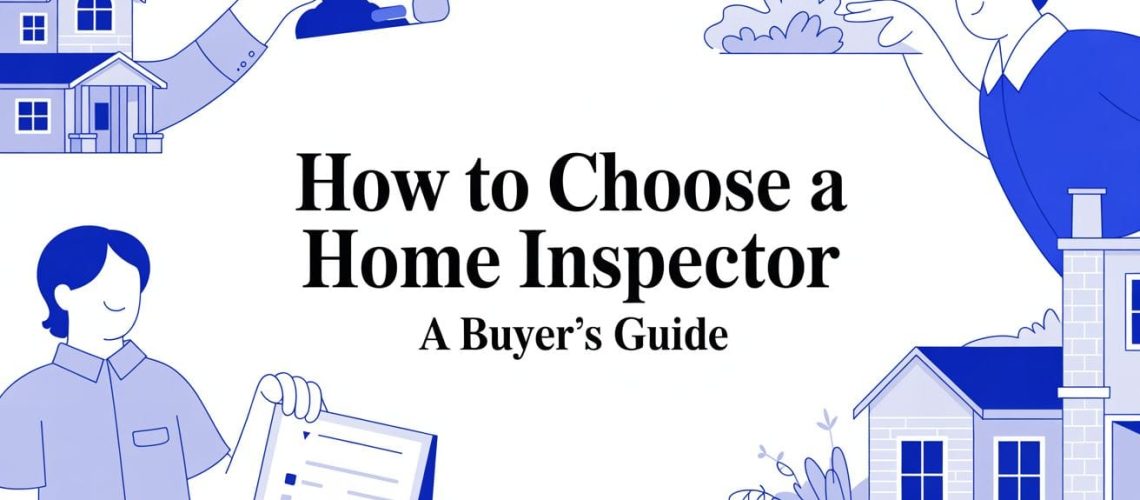Choosing a home inspector seems straightforward, right? Find a certified professional with good reviews, look at their sample report, and you’re set. While that’s the gist of it, the reality is a little more nuanced. Getting this choice right is what protects your investment and prevents nasty, expensive surprises down the road.
Why Your Choice of Home Inspector Matters

When you’re buying a home in the Memphis area, the home inspection can feel like just one more box to check on a seemingly endless to-do list. But I’m here to tell you it's arguably the most critical step in the entire home-buying journey.
A great inspector is so much more than a box-checker. Think of them as your personal property detective, hired to uncover clues about a home’s real condition that you just can't see during a showing. They give you the unvarnished truth you need to make a confident, financially sound decision.
A detailed, professional inspection report is a powerful tool. It’s your leverage. It can reveal hidden problems that could drain your bank account later—things like a failing HVAC system or the subtle signs of foundation trouble that are so common in West Tennessee soil. This knowledge becomes your strongest negotiating asset, empowering you to request repairs, ask for a price reduction, or, in the most serious cases, walk away from a potential money pit.
The Real Cost of a Bad Inspection
On the flip side, a cheap or rushed inspection gives you a false sense of security. An inexperienced inspector can easily miss major red flags, leaving you to deal with the fallout after the keys are in your hand. Imagine the shock of learning your new home needs a $15,000 roof replacement just a few months after moving in—a detail a seasoned pro would have absolutely spotted.
This guide is designed to cut through the generic advice. We'll give you practical, actionable steps to vet and select a home inspector who has the diligence and expertise your investment deserves. Your goal is to find a partner who will advocate for you. For a deeper dive into the inspection process from another angle, you can review these comprehensive home inspection insights.
A great home inspection is more than just a report; it's your roadmap to understanding the property's true condition. It empowers you to negotiate effectively and plan for future maintenance with your eyes wide open.
What You Will Learn
Throughout this guide, we're going to break down what truly separates an exceptional inspector from an average one. You’ll learn exactly what credentials matter, the right questions to ask, and how to read between the lines of a report. Our mission is to arm you with the confidence to select a true professional, like our team at Upchurch Inspection, who will give you a clear, unbiased assessment of your potential new home.
Navigating Home Inspector Credentials and Certifications

When you start looking for a home inspector, you're going to run into a sea of acronyms and official-sounding titles. It's easy to just skim past them, but the difference between a basic license and a real professional certification is huge. Getting a handle on these qualifications is a big part of learning how to choose a home inspector you can actually trust.
Here in Tennessee, every home inspector is required to be licensed. Think of this as the bare minimum—it means they've passed a baseline exam and carry the right insurance. It's a good start, but it’s just that: a start.
The real pros don't stop there. They go the extra mile to earn certifications from nationally recognized organizations. These groups hold their members to a much higher standard, requiring tough training, a strict code of ethics, and, most importantly, continuous education to keep up with an ever-changing industry.
The Gold Standard of Certifications
In the world of home inspections, two names consistently rise to the top: InterNACHI and ASHI. If you see these on an inspector's website or truck, it’s a very good sign.
InterNACHI (International Association of Certified Home Inspectors): Known for its incredibly tough entrance exam and demanding continuing education, InterNACHI makes sure its members are always at the top of their game. An InterNACHI Certified Professional Inspector is someone who's proven they're dedicated to mastering their profession.
ASHI (American Society of Home Inspectors): As the oldest professional home inspector association in North America, ASHI has built a solid reputation for quality. To become a member, an inspector has to pass a rigorous exam and stick to a comprehensive Standard of Practice and Code of Ethics.
These aren't just fancy badges. They represent a serious commitment to doing the job right, which is exactly what you need when you're making such a huge investment.
Choosing an inspector certified by an organization like InterNACHI or ASHI means you’re hiring someone who is held accountable to a higher authority than just the state licensing board. It's an assurance of quality and ethical conduct.
Why Certifications Translate to Better Inspections
Let’s put this in real-world terms. Say an inspector spots a water stain under a window.
An inspector with just a basic license might note: "Water stain below window." Okay, that's true, but it doesn't help you at all. Why is it there? Is it a big deal? What do I do now?
A certified inspector, on the other hand, is trained to connect the dots. Their report would likely read something like: "Evidence of active moisture intrusion at the living room window. The exterior sealant is failing, and the flashing appears to be improperly installed. Recommend further evaluation and repair by a qualified contractor to prevent potential structural damage."
See the difference? One is an observation; the other is a diagnosis with a clear path forward. That level of detail comes directly from better training and experience. With over 9,914 active home inspectors in the U.S., these credentials are what separate the truly proficient from everyone else.
Ask for Proof and Understand the Value
Don't ever feel awkward about asking to see an inspector's credentials. A true professional will be proud to show you.
At Upchurch Inspection, our team is not only licensed by the state of Tennessee but also holds certifications that show our deep commitment to excellence. For a deeper dive into what these all mean, check out our guide on decoding home inspector qualifications.
Taking a moment to verify these qualifications is how you ensure you're hiring an expert who has your back, giving you the confidence and peace of mind you deserve.
Key Questions to Ask a Potential Home Inspector

Think of hiring a home inspector less like a transaction and more like a job interview. You're bringing an expert onto your team whose judgment you need to trust completely, and a quick phone call is your chance to get a real feel for their experience, process, and communication style.
This isn't just about comparing prices. It's about finding someone with the local know-how for Memphis and West Tennessee homes—someone who understands our unique soil conditions and the common quirks of different construction eras, from historic Midtown properties to new builds out in Arlington.
A few well-chosen questions can tell you everything you need to know about their professionalism and whether they're the right fit for you.
Getting a Feel for Their Experience and Process
Start with the basics. You need to understand how they work and what kind of experience they're bringing to the table. If you get vague or slippery answers here, that's your first red flag.
"How many inspections have you personally performed?" Experience is everything in this business. An inspector who has seen it all—hundreds, if not thousands of times—can spot subtle clues a rookie might miss.
"Do you have experience with homes this age and style in my neighborhood?" The potential issues in a 1920s Bungalow are worlds away from those in a modern build. An inspector who knows the local housing stock knows exactly what to look for.
"How long does an inspection usually take, and can I be there?" A thorough inspection on an average-sized home should take a solid 3 to 4 hours. Anything less might signal a rushed job. More importantly, a great inspector will always encourage you to attend, at least for a final summary.
That last point is a deal-breaker. If an inspector seems hesitant about you being there, they might be cutting corners or just don't want to answer questions. You want a partner who welcomes your involvement.
A home inspector's willingness to have you on-site for a final walk-through is a clear indicator of transparency and confidence in their work. It's your single best opportunity to see issues firsthand and ask critical questions.
A Quick Interview Guide
Before you even book, a short phone interview can tell you volumes. Here are a few essential questions to ask and what their answers really mean.
| Home Inspector Interview Questions and What to Listen For |
| :— | :— | :— |
| Question to Ask | A Great Answer Includes | Potential Red Flag |
| "What licenses and certifications do you hold?" | Specifics like being a Tennessee Licensed Home Inspector and a Certified Professional Inspector through an organization like InterNACHI. | Vague answers, no mention of state licensing, or certifications from unknown organizations. |
| "What technology do you use during an inspection?" | Mention of specific tools like thermal imaging cameras, moisture meters, and drones for inaccessible roofs. They explain why these tools help. | Dismissing technology as unnecessary or just listing basic tools like a flashlight and ladder. |
| "Can I see a sample report?" | An enthusiastic "Yes!" followed by sending a link to a detailed, modern digital report with high-res photos and clear explanations. | Hesitation, or offering to send an old-school, text-heavy PDF checklist that's hard to read. |
| "How long will the inspection take, and can I attend?" | A clear time estimate (3-4 hours for an average home) and an open invitation for you to be present, especially for the wrap-up. | A rushed timeline (1-2 hours) or discouraging you from attending, saying it "slows them down." |
This isn't about grilling them, but about feeling confident that you're hiring a true professional who is thorough and transparent.
Evaluating Their Reporting and Communication
The best inspection in the world is useless if the report is a confusing mess. The final piece of the puzzle is understanding how they'll communicate their findings to you.
Ask them straight up: What does your report look like? A top-tier report is a detailed, digital document packed with high-resolution photos. It should clearly explain what the issue is, why it matters, and what the next steps should be—not just a laundry list of problems.
Then ask: How quickly will I get it? In today's market, speed is critical. You should expect your digital report within 24 hours, which is vital when you’re facing a tight option period deadline.
For a complete checklist of what to ask, be sure to check out our guide on the top 10 questions to ask your home inspector.
Ultimately, your conversation should leave you feeling informed and confident. You’re looking for a patient, knowledgeable professional who is ready to be your advocate. At Upchurch Inspection, we welcome these questions—we believe an educated client is our best client.
How to Read a Sample Inspection Report
An inspector’s license and experience are important, but their real value shows up in the final report. Requesting a sample report before you hire is one of the most powerful moves you can make, yet it’s a step far too many buyers skip. This single document tells you everything you need to know about an inspector's thoroughness, communication style, and attention to detail.
Think of it as the difference between a blurry photo and a high-definition image. A subpar report gives you a vague, confusing picture of the property. A great one provides crystal-clear insights that empower you to act with confidence.
Spotting the Difference Between Good and Bad Reports
When you get a sample report, you’re not just looking for a list of problems; you’re evaluating how those problems are presented. A low-quality report is often just a generic checklist with some copied-and-pasted text. The language is vague, the photos are dark or useless, and you’re left with more questions than answers.
A high-quality report, on the other hand, tells a story. It’s a narrative about the home.
- Vague Comment: "Roof issue noted."
- Actionable Finding: "Missing step flashing on the north side of the chimney is allowing water entry, as confirmed with a moisture meter. Recommend immediate repair by a qualified roofer to prevent further sheathing and framing deterioration."
See the difference? The second example doesn't just point out a problem—it explains the exact location, the cause, the consequences, and the next step. That is the level of detail you should expect.
A great inspection report is more than a list of defects; it’s an educational tool. It should teach you about the home, showing you what’s important, what needs monitoring, and what requires immediate attention.
Key Elements of a Modern Digital Report
The days of paper checklists are long gone. The industry standard is a modern, web-based digital report that is easy to navigate, understand, and share. These reports are designed for clarity and action, giving you a powerful tool for your negotiations.
Look for these specific features in a sample report:
High-Resolution Photos and Videos: Every single finding should be documented with clear, well-lit photos. Arrows, circles, or other markups that point directly to the issue are a huge plus. Video can be especially useful for illustrating active problems, like a running toilet or a noisy HVAC unit.
A Detailed Summary Section: A well-organized summary is your best friend during negotiations. It should be right at the beginning of the report and highlight the most significant findings—material defects and safety hazards—so you and your agent don't have to hunt for them.
Clear, Action-Oriented Language: The report should be written in plain English, not overly technical jargon. Each comment needs to clearly state the inspector's observation, explain why it's a concern, and suggest a logical course of action (e.g., "monitor," "repair," or "further evaluation by a specialist").
This level of clarity is non-negotiable. It allows you and your real estate agent to quickly build a repair request list without having to decipher cryptic notes.
What the Report Reveals About the Inspector
Ultimately, a sample report is a direct reflection of the inspector’s work ethic. A detailed, easy-to-read report filled with specific observations shows you’re dealing with a diligent professional who takes pride in their work. A sloppy, generic one suggests they might take that same lazy approach when walking through your potential home.
At Upchurch Inspection, we believe our reports are one of our greatest strengths. We invite you to see the difference for yourself by viewing a full sample inspection report on our website. Taking ten minutes to review it will give you a clear benchmark for what a truly professional report looks like, ensuring you hire an inspector who provides the clarity and confidence you deserve.
Specialized Inspections You Might Need
A standard home inspection is incredibly thorough, designed to give you a comprehensive look at all the major systems, from the foundation right up to the roof. Think of it as a general physical for the house. But just like with people, sometimes a specialist is needed to look deeper into specific concerns.
Certain hidden environmental or structural issues require specialized tools and expertise to uncover. Understanding which ancillary services to add to your inspection is a key part of learning how to choose a home inspector who can deliver a complete picture of the property. These add-ons aren't upsells; they're strategic investments that can save you from massive costs and health risks down the road. For many properties, especially here in West Tennessee, they are an absolute necessity.
Sewer Scope Inspections for Older Homes
One of the most valuable add-ons I recommend, particularly for homes built before 1980, is a sewer scope inspection. We feed a specialized, high-resolution camera down the main sewer line, from the house all the way to the city connection at the street. This gives us a real-time video feed of the pipe’s interior condition.
Why is this so critical? Older homes in areas like Memphis often have their original sewer lines made of cast iron or clay. After decades in the ground, these pipes can be seriously compromised by a few common culprits:
- Tree Root Intrusion: Roots are relentless in their search for water and can easily crack or invade pipe joints, causing nasty blockages and backups.
- Pipe Collapse or Cracks: Shifting soil, ground settlement, and sheer age can cause sections of the pipe to break down or collapse entirely.
- Significant Blockages: Years of grease, sediment, and other buildup can create stubborn clogs that a simple drain snake won't touch.
A standard inspection can only tell us if the drains are working today. It can't see a disaster waiting to happen underground. A full sewer line replacement can cost anywhere from $5,000 to over $25,000, which makes a sewer scope a small price to pay for genuine peace of mind.
This simple decision tree shows why paying attention to the details—whether it’s the quality of a report or the condition of a hidden system—is so important.

Just like clear photos are a good sign in an inspection report, a clear sewer line is a fantastic sign for a home's plumbing health.
Protecting Your Health with Radon and Mold Testing
Some of the biggest threats in a home are the ones you can't see, smell, or taste. Radon, a naturally occurring radioactive gas, is the second leading cause of lung cancer in the United States. It's invisible and can seep into any home through tiny cracks in the foundation. The only way to know if a home has elevated levels is to test for it.
Mold is another huge concern, especially in the humid climate we have in West Tennessee. While any good inspector will point out visible signs of mold, specialized air quality or surface testing can identify hidden colonies behind walls or in crawl spaces that can cause serious respiratory issues.
Any home can have a radon problem—new or old, with or without a basement. Testing is a simple, inexpensive step that protects your family's long-term health.
Using Technology to See the Unseen
The best inspectors use modern technology to find issues that the naked eye would miss. At Upchurch Inspection, we bring an infrared camera to every single inspection because it helps us spot things like:
- Hidden water leaks behind drywall or above ceilings.
- Missing or inadequate insulation in walls and attics.
- Overheating electrical components, which are a serious fire hazard.
Finally, a separate wood-destroying insect (WDI) inspection is crucial. A general inspector will note visible signs of termite damage, but a licensed pest control expert performs the official WDI report that lenders almost always require. If our inspection reveals potential concerns, a specialized termite inspection will be our top recommendation. This helpful guide on how to identify termites can help you understand what they're looking for.
Choosing the right combination of these specialized services ensures there are no blind spots in your property evaluation. It transforms a standard inspection into a truly exhaustive assessment, giving you the clarity you need to make a confident purchase.
Still Have Questions? Here Are Some Quick Answers
Even after you've done your homework, a few questions always pop up. It's totally normal. Making a big decision like this often comes down to the practical details that affect you directly. We get these questions all the time from clients here in the Memphis area, so I wanted to tackle them head-on.
Think of this as the final check-in before you move forward. We'll cover everything from cost to whether you should listen to your agent, giving you the straightforward answers you need.
How Much Does a Home Inspection Cost in the Memphis Area?
This is usually the first thing people ask. While the price tag can shift based on the home’s size, age, and whether it has a crawlspace or slab foundation, you can generally expect a standard home inspection in Memphis and West Tennessee to be in the $350 to $600 range. Naturally, a larger, historic home in Midtown is going to be on the higher end of that scale compared to a newer, smaller house in a suburb.
But here’s how you really need to look at it: this isn't an expense. It's a small, one-time investment to protect a massive one. Discovering a failing HVAC system or a hidden foundation problem after you’ve closed can easily cost you tens of thousands of dollars. The inspection fee is a tiny price to pay for that kind of peace of mind.
Keep in mind, specialized services are priced separately. For instance, adding a radon test might run an extra $100 to $150, while a sewer scope inspection could be anywhere from $250 to $400. We always provide a clear, itemized quote upfront so you know exactly what to expect—no surprises.
Should I Use the Inspector My Real Estate Agent Recommends?
This is a great question, and the answer isn't a simple yes or no. A recommendation from an agent you trust is a fantastic starting point. Good agents build a network of reliable pros they’ve seen do great work, and they can usually point you toward a few competent inspectors they’d trust with their own family.
However—and this is important—the final call has to be yours. A truly great agent understands their role. They will give you a list of vetted options but will also tell you to do your own research. They know the inspector works for you, and only you. Your confidence in that inspector is what matters most.
Your real estate agent is your guide in the transaction, but your home inspector is your advocate for the property itself. It's vital to choose an inspector you feel confident will represent your best interests, independent of anyone else involved in the deal.
Use your agent's list as a shortcut to narrow the field. Then, vet each one yourself. Check their license and certifications, dig into their online reviews, and definitely ask to see a sample report before you make a decision.
Do I Really Need to Attend the Home Inspection?
Yes. One hundred percent, yes. While you don’t need to shadow the inspector for the entire 3 to 4 hours, you absolutely should plan to be there for the last hour or so. Any inspector worth their salt will welcome your presence and use it as a chance to walk you through the home.
Being there in person gives you a level of understanding that even the most detailed report can't capture. The inspector can physically point to a concern, explain what it means in practical terms, and answer your questions right then and there. It turns a comment on a report from an abstract sentence into real, tangible knowledge about the house you're about to buy.
Attending the summary is also your best opportunity to learn where everything is. The inspector will show you crucial things like:
- Where the main water shut-off valve is located (you’ll thank them later!).
- How to properly change the furnace filter.
- The location of the electrical panel and how to reset a breaker.
This is an invaluable orientation, especially if you're a first-time homebuyer.
What Happens If the Inspection Uncovers Major Problems?
First, don't panic. Finding problems is the whole point of an inspection. It's incredibly rare for a report to come back completely clean, even on brand-new construction. Finding issues doesn’t mean the deal is dead; it just means you're now armed with the information you need to proceed wisely.
When significant defects pop up, your inspection report becomes your most powerful negotiating tool. Thanks to the inspection contingency in your purchase agreement, you typically have a few paths forward:
- Request Repairs: You can ask the seller to hire qualified professionals to fix specific issues before closing.
- Negotiate Price or Credits: If you'd rather handle the repairs yourself, you can ask the seller for a price reduction or a credit at closing to offset the cost.
- Walk Away: If the problems are simply too big or too expensive for you to handle, your contingency clause usually allows you to back out of the contract and get your earnest money back.
Your real estate agent will be your key partner here, helping you strategize the best response based on the findings.
Getting through the home inspection is one of the most critical hurdles in buying a home. When you ask the right questions and team up with a thorough, certified professional, you’re not just buying a house—you’re making a sound investment. The team at Upchurch Inspection is here to give you the clarity and confidence you need to make the right choice.
Schedule your comprehensive home inspection with Upchurch Inspection today.


